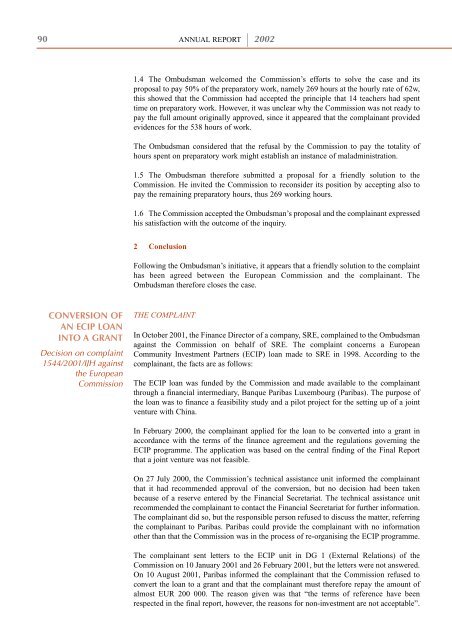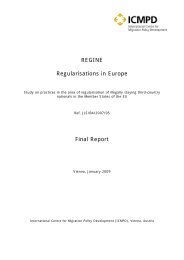Annual report 2002 - EOI
Annual report 2002 - EOI
Annual report 2002 - EOI
Create successful ePaper yourself
Turn your PDF publications into a flip-book with our unique Google optimized e-Paper software.
90 ANNUAL REPORT | <strong>2002</strong><br />
1.4 The Ombudsman welcomed the Commission’s efforts to solve the case and its<br />
proposal to pay 50% of the preparatory work, namely 269 hours at the hourly rate of 62w,<br />
this showed that the Commission had accepted the principle that 14 teachers had spent<br />
time on preparatory work. However, it was unclear why the Commission was not ready to<br />
pay the full amount originally approved, since it appeared that the complainant provided<br />
evidences for the 538 hours of work.<br />
The Ombudsman considered that the refusal by the Commission to pay the totality of<br />
hours spent on preparatory work might establish an instance of maladministration.<br />
1.5 The Ombudsman therefore submitted a proposal for a friendly solution to the<br />
Commission. He invited the Commission to reconsider its position by accepting also to<br />
pay the remaining preparatory hours, thus 269 working hours.<br />
1.6 The Commission accepted the Ombudsman’s proposal and the complainant expressed<br />
his satisfaction with the outcome of the inquiry.<br />
2 Conclusion<br />
Following the Ombudsman’s initiative, it appears that a friendly solution to the complaint<br />
has been agreed between the European Commission and the complainant. The<br />
Ombudsman therefore closes the case.<br />
CONVERSION OF<br />
AN ECIP LOAN<br />
INTO A GRANT<br />
Decision on complaint<br />
1544/2001/IJH against<br />
the European<br />
Commission<br />
THE COMPLAINT<br />
In October 2001, the Finance Director of a company, SRE, complained to the Ombudsman<br />
against the Commission on behalf of SRE. The complaint concerns a European<br />
Community Investment Partners (ECIP) loan made to SRE in 1998. According to the<br />
complainant, the facts are as follows:<br />
The ECIP loan was funded by the Commission and made available to the complainant<br />
through a financial intermediary, Banque Paribas Luxembourg (Paribas). The purpose of<br />
the loan was to finance a feasibility study and a pilot project for the setting up of a joint<br />
venture with China.<br />
In February 2000, the complainant applied for the loan to be converted into a grant in<br />
accordance with the terms of the finance agreement and the regulations governing the<br />
ECIP programme. The application was based on the central finding of the Final Report<br />
that a joint venture was not feasible.<br />
On 27 July 2000, the Commission’s technical assistance unit informed the complainant<br />
that it had recommended approval of the conversion, but no decision had been taken<br />
because of a reserve entered by the Financial Secretariat. The technical assistance unit<br />
recommended the complainant to contact the Financial Secretariat for further information.<br />
The complainant did so, but the responsible person refused to discuss the matter, referring<br />
the complainant to Paribas. Paribas could provide the complainant with no information<br />
other than that the Commission was in the process of re-organising the ECIP programme.<br />
The complainant sent letters to the ECIP unit in DG 1 (External Relations) of the<br />
Commission on 10 January 2001 and 26 February 2001, but the letters were not answered.<br />
On 10 August 2001, Paribas informed the complainant that the Commission refused to<br />
convert the loan to a grant and that the complainant must therefore repay the amount of<br />
almost EUR 200 000. The reason given was that “the terms of reference have been<br />
respected in the final <strong>report</strong>, however, the reasons for non-investment are not acceptable”.
















